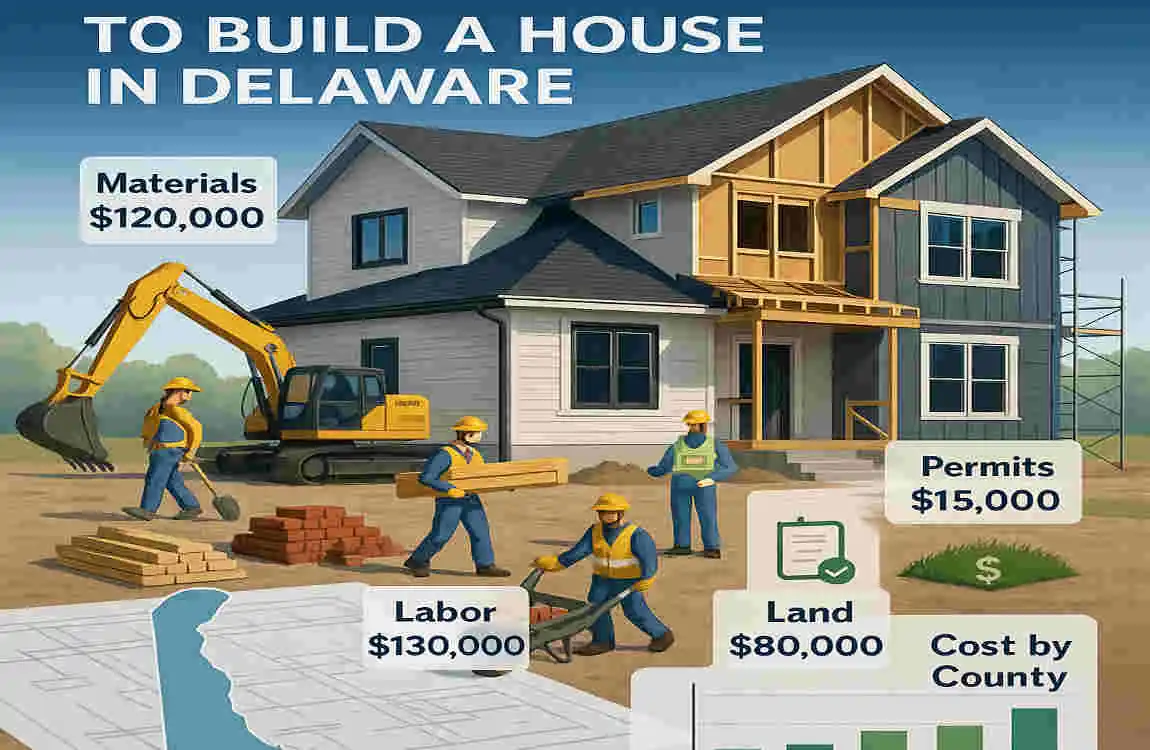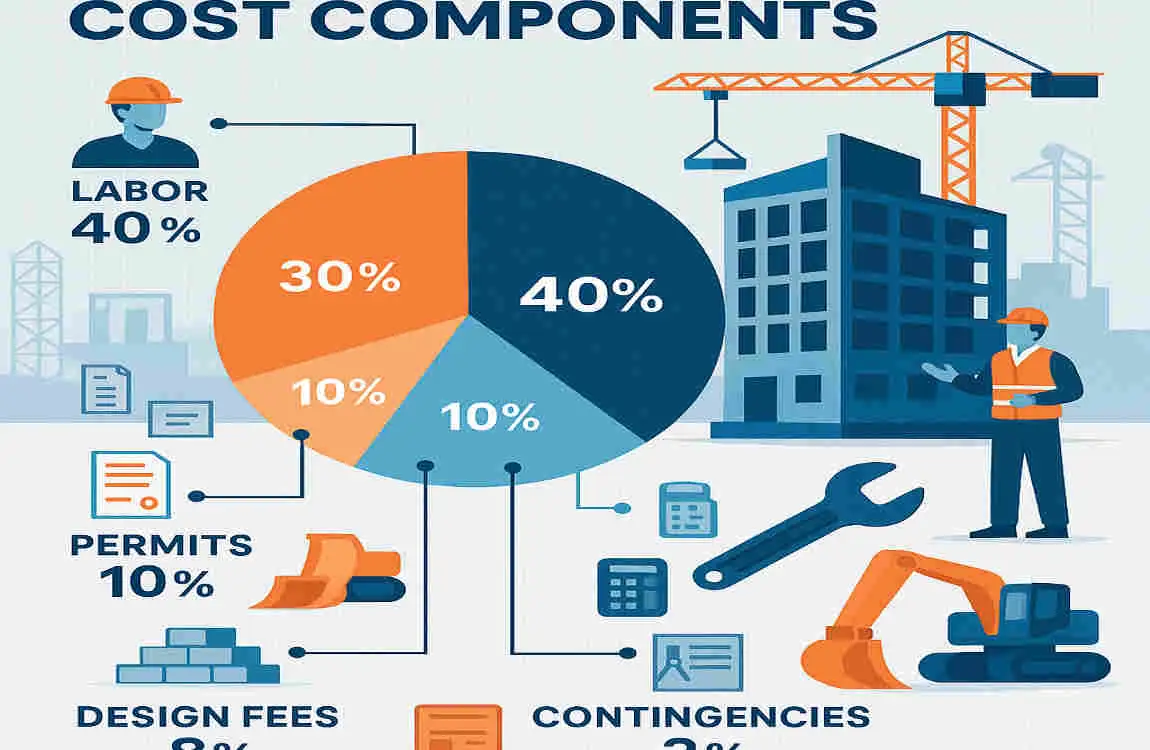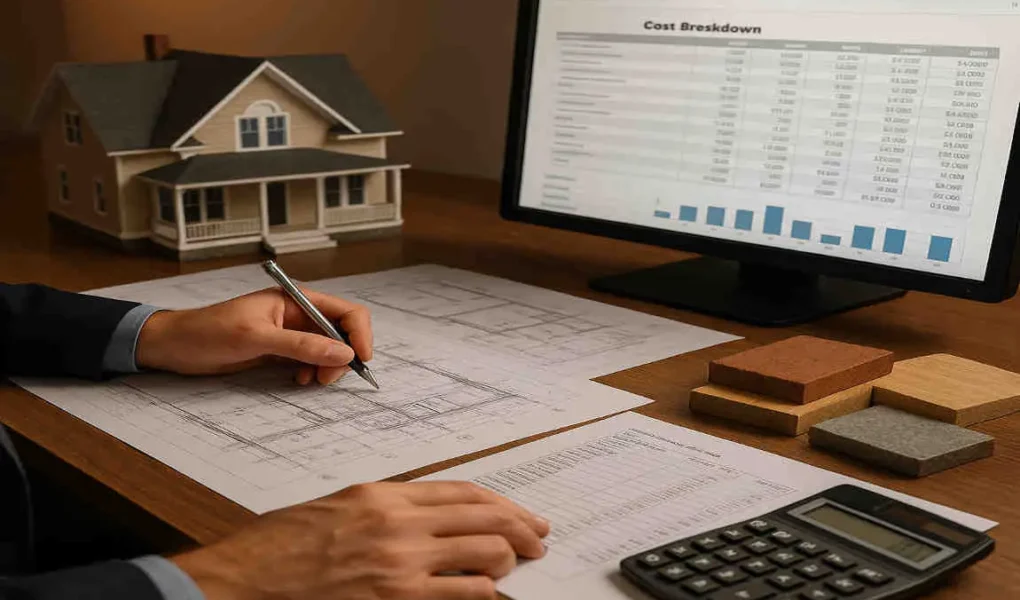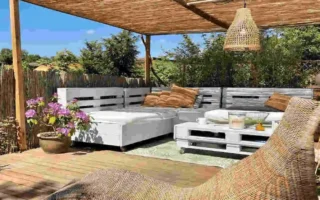Are you dreaming of building your perfect home in Delaware? Before you start picking out paint colors and flooring, there’s one crucial question you need to answer: how much does it cost to build a house in Delaware? Estimating house construction costs is a vital step for prospective homeowners and builders alike. It helps you set a realistic budget, plan your finances, and ensure your dream home becomes a reality.
Understanding the Average Cost to Build a House in Delaware

When it comes to building a house in Delaware, it’s essential to have a baseline understanding of the average costs involved. According to recent data, the average construction cost per square foot in Delaware is around $170. This means that for an average-sized house, you can expect to pay between $270,000 and $550,000.
Factors That Affect Average Costs
Several factors can influence the average cost of building a house in Delaware:
- House size: The larger your home, the more materials and labor you’ll need, which can significantly impact the overall cost.
- Custom features: If you’re looking to add unique elements like a gourmet kitchen or a home theater, be prepared for additional expenses.
- Location: Land costs can vary depending on where you choose to build in Delaware, so this factor should be considered when estimating your budget.
Key Factors That Influence Construction Costs in Delaware
Now that you have a general idea of the average costs, let’s take a closer look at the key factors that can influence the construction costs of your Delaware house.
Land Costs
One of the first expenses you’ll encounter when building a house is the cost of the land itself. In Delaware, the average price per acre can range from $20,000 to $50,000, depending on the location and size of the lot. Keep in mind that these costs can add up quickly, so it’s essential to factor them into your overall budget.
Material Costs
Materials make up a significant portion of your construction costs, typically averaging around $50 per square foot. This includes everything from the foundation and framing to the roofing, windows, doors, and flooring. To get a more accurate estimate, it’s helpful to break down these costs into specific categories:
- Foundation: $5 to $15 per square foot
- Framing: $10 to $20 per square foot
- Roofing: $3 to $7 per square foot
- Windows and doors: $2 to $5 per square foot
- Flooring: $3 to $10 per square foot
Labor Costs
Labor costs can vary depending on the quality and availability of workers in your area. In Delaware, you can expect to pay between $20 and $40 per hour for skilled labor. Keep in mind that these rates can fluctuate based on the specific trade and the complexity of the work involved.
Permits and Fees
Before you can start building your Delaware house, you’ll need to obtain the necessary permits and pay any associated fees. These costs can add up to $5,000 or more, depending on the size and scope of your project. It’s essential to factor these expenses into your budget and ensure you have all the required documentation before breaking ground.
You may also read (how long does it really take to build a house).
Indirect Costs
In addition to the direct costs of materials, labor, and permits, there are several indirect costs to consider when building a house in Delaware. These may include:
- Land preparation: Clearing the site, grading the land, and preparing it for construction can add to your overall expenses.
- Utility connections: Hooking up your new home to water, electricity, and sewer systems can incur additional costs.
- Interior finishes: While not directly related to construction, the cost of interior finishes like paint, wallpaper, and fixtures should be included in your budget.
Step-by-Step Guide to Estimating Construction Costs for Your Delaware House
Now that you understand the key factors that influence construction costs in Delaware, let’s walk through a step-by-step guide to help you create an accurate estimate for your own project.
Determine the Size and Style of the House You Want to Build
The first step in estimating construction costs is to determine the size and style of the house you want to build. Consider factors like the number of bedrooms and bathrooms, the layout of the space, and any custom features you’d like to include. Once you have a clear vision of your dream home, you can start to calculate the costs.
Research and Estimate Land Acquisition Costs in Your Targeted Delaware Location
Next, research the cost of land in your desired location in Delaware. Look for properties that meet your size and location requirements, and factor in the average price per acre to estimate the land acquisition costs. Keep in mind that these costs can vary widely depending on the area, so it’s essential to do your due diligence.
Itemize Material Costs Including Foundation, Framing, Roofing, Windows, Doors, and Flooring
With your land costs in mind, it’s time to itemize the material costs for your Delaware house. Break down the costs into specific categories like foundation, framing, roofing, windows, doors, and flooring. Use the average costs per square foot we discussed earlier as a starting point, and adjust them based on your specific needs and preferences.
Calculate Labor Costs, Considering Trade-Specific Rates
Labor costs can be a significant portion of your overall construction budget, so it’s essential to calculate them accurately. Consider the trade-specific rates for the various skilled workers you’ll need, such as carpenters, electricians, plumbers, and roofers. Factor in the estimated hours required for each task, and multiply them by the hourly rates to get a rough estimate of your labor costs.
Include Permits, Utility Hookups, and Inspections
Don’t forget to include the costs of permits, utility hookups, and inspections in your overall budget. These expenses can add up quickly, so it’s crucial to factor them in from the start. Research the specific requirements for your Delaware location, and include the associated costs in your estimate.
Add Contingency and Overhead Costs
Finally, it’s always a good idea to include a contingency and overhead costs in your construction budget. These can account for unexpected expenses, delays, and other unforeseen circumstances. A common rule of thumb is to add 10-20% of your total budget for contingency and overhead costs, but you can adjust this based on your specific needs and risk tolerance.
Detailed Breakdown of Major Construction Cost Components

Now that you have a step-by-step guide to estimating construction costs, let’s take a closer look at the significant components that make up these expenses.
Materials
As we mentioned earlier, materials can account for around $50 per square foot of your construction costs. Here’s a more detailed breakdown of the significant material components:
- Framing: The framing of your house is the skeleton that supports the entire structure. Expect to pay between $10 and $20 per square foot for framing materials.
- Roofing: Your roof is essential for protecting your home from the elements. Roofing materials can cost between $3 and $7 per square foot, depending on the type and quality.
- Insulation: Proper insulation is crucial for keeping your home comfortable and energy-efficient. Insulation costs can range from $1 to $3 per square foot.
- Flooring: Your choice of flooring can significantly impact the overall cost of your home. Hardwood, tile, and carpet can range from $3 to $10 per square foot.
- Cabinets and countertops: The kitchen and bathroom are often the heart of the home, and the cabinets and countertops can be a significant expense. Expect to pay between $50 and $200 per linear foot for cabinets and $50 to $200 per square foot for countertops.
- Plumbing fixtures: From sinks and toilets to showers and bathtubs, plumbing fixtures are essential for your home’s functionality. These can cost between $500 and $5,000, depending on the quality and style.
Labor
Labor costs can vary widely depending on the specific trade and the complexity of the work involved. Here’s a rough breakdown of the significant labor components:
- Carpentry: Carpenters are responsible for framing, installing trim, and building custom features. Expect to pay between $20 and $40 per hour for skilled carpentry work.
- Electrical: Electricians handle the wiring and electrical systems of your home. Their rates can range from $50 to $100 per hour.
- Plumbing: Plumbers install and maintain the plumbing systems in your home. Their rates can range from $45 to $150 per hour.
- Roofing: Roofers are responsible for installing and repairing your home’s roof. Their rates can range from $30 to $60 per hour.
- Finishing: Finishing work includes painting, drywall installation, and other final touches. Expect to pay between $20 and $50 per hour for skilled finishing work.
Permits and Inspections
Before you can start building your Delaware house, you’ll need to obtain the necessary permits and pass inspections. These costs can add up to $5,000 or more, depending on the size and scope of your project. Here’s a rough breakdown of the major permit and inspection components:
- Building permit: This is the primary permit required for construction and can cost between $500 and $2,000.
- Electrical license: This permit is required for electrical work and can cost between $100 and $500.
- Plumbing permit: This permit is required for plumbing work and can cost between $100 and $500.
- Inspections: Inspections are required at various stages of construction to ensure compliance with building codes. These can cost between $100 and $500 per inspection.
Additional Expenses
In addition to the significant construction cost components, there are several additional expenses to consider when building a house in Delaware. These may include:
- Landscaping: Landscaping can add beauty and value to your home, but it can also be a significant expense. Expect to pay between $5,000 and $20,000 for professional landscaping services.
- Driveways: A driveway is essential for accessing your home, but can also be a costly addition. Expect to pay between $3,000 and $10,000 for a standard driveway.
- Exterior painting: Painting the exterior of your home can protect it from the elements and enhance its curb appeal. Expect to pay between $2,000 and $5,000 for professional exterior painting services.
Tips to Save Money When Building a House in Delaware
Building a house can be a significant investment, but there are several ways to save money without compromising quality. Here are some tips to help you keep your construction costs in check:
Choose Cost-Effective Materials
One of the most effective ways to save money when building a house is to choose cost-effective materials. This doesn’t mean sacrificing quality, but instead selecting materials that offer the best value for your money. For example, consider using vinyl siding instead of brick or stone, or opt for laminate flooring instead of hardwood.
Hire Local Contractors
Another way to save money is to hire local contractors for your construction project. Local contractors often have lower overhead costs and can offer more competitive rates than larger, out-of-state companies. Additionally, they possess a deeper understanding of local building codes and regulations, which can help streamline the process and minimize delays.
Plan Efficient Home Designs
The design of your home can also impact your construction costs. By planning an efficient home design, you can reduce waste and labor hours, which can translate into significant savings. Consider factors like the layout of the space, the placement of windows and doors, and the flow of the home to maximize efficiency.
Time Construction Phases
Finally, timing your construction phases can help you take advantage of off-season discounts and save money. For example, if you can start construction in the winter months when demand is lower, you can negotiate better rates with contractors and suppliers. Just be sure to factor in any potential delays due to weather or other factors.
Comparison: Building vs Buying a Home in Delaware
When it comes to becoming a homeowner in Delaware, you have two main options: building a new home or buying an existing one. Each option has its pros and cons, so it’s essential to consider your specific needs and circumstances before making a decision.
Pros and Cons of Building a Home
Building a new home in Delaware can offer several advantages, including:
- Customization: When you build a home, you have complete control over the design, layout, and features. This allows you to create a home that perfectly suits your needs and preferences.
- Energy efficiency: New homes are often built with the latest energy-efficient technologies and materials, which can help you save money on utility bills in the long run.
- Warranty protection: Many new homes come with warranty protection, which can give you peace of mind and protect you from unexpected repair costs.
However, building a home also has some potential drawbacks, including:
- Higher costs: Building a new home can be more expensive than buying an existing one, especially if you’re looking to add custom features and high-end finishes.
- Longer timeline: The construction process can take several months or even years, depending on the size and complexity of your project. This means you’ll need to be patient and flexible with your timeline.
Pros and Cons of Buying a Home
On the other hand, buying an existing home in Delaware can offer several benefits, including:
- Lower costs: In many cases, buying an existing home can be less expensive than building a new one, especially if you’re looking for a more affordable option.
- Faster timeline: When you buy an existing home, you can often move in much faster than if you were building from scratch. This can be a significant advantage if you need to relocate quickly.
However, buying a home also has some potential drawbacks, including:
- Limited customization: When you buy an existing home, you’re limited to the design and features that are already in place. This means you may need to compromise on certain aspects of your dream home.
- Potential repairs: Older homes may require more maintenance and repairs, which can add to your overall costs over time.
When to Build vs Buy
Ultimately, the decision to build or buy a home in Delaware depends on your specific needs, budget, and timeline. If you’re looking for a custom-designed home with the latest energy-efficient features, a building may be the best option for you. However, if you’re on a tighter budget or need to move in quickly, buying an existing home may be a better fit.
Common Mistakes to Avoid When Estimating Construction Costs
Estimating construction costs can be a complex process, and it’s easy to make mistakes along the way. Here are some common pitfalls to avoid when creating your budget:
Underestimating Costs
One of the most common mistakes people make when estimating construction costs is underestimating the total expenses. This can happen when you fail to account for all the necessary components, such as permits, utility hookups, and indirect costs. To avoid this, be sure to include all the relevant expenses in your budget and add a contingency fund for unexpected costs.
Skipping Detailed Estimates
Another mistake to avoid is skipping detailed estimates for each phase of construction. It’s tempting to create a rough estimate and move forward, but this can lead to significant discrepancies between your budget and the actual costs. Instead, take the time to produce detailed forecasts for each component, including materials, labor, and any additional expenses.
Ignoring Potential Cost Overruns
Ultimately, it’s crucial to account for the potential for cost overruns and unexpected delays when estimating construction costs. Even with the most careful planning, things can go wrong during construction, leading to additional expenses. To mitigate this risk, include a contingency fund in your budget and be prepared to adapt your plans if necessary.
Helpful Tools and Resources for Accurate Cost Estimation in Delaware
Estimating construction costs can be a daunting task, but there are several tools and resources available to help you create an accurate budget. Here are some helpful options to consider:
Online Calculators
There are several online calculators available that can help you estimate construction costs for your Delaware home. These calculators take into account factors like the size and style of your home, the materials you plan to use, and the local labor rates to provide a rough estimate of your expenses. While these tools can be helpful, keep in mind that they may not account for all the unique factors of your project, so it’s essential to use them as a starting point and adjust your estimates accordingly.
Local Builders’ Cost Guides
Another valuable resource for estimating construction costs is local builders’ cost guides. These guides are often published by local builders’ associations or home builders and provide detailed information on the average costs of materials, labor, and other expenses in your area. By consulting these guides, you can get a more accurate picture of the costs you can expect to incur when building your Delaware home.
Delaware State Resources
The state of Delaware offers several resources to help you navigate the construction process and estimate your costs. For example, the Delaware Division of Revenue provides information on building permits and fees. At the same time, the Delaware Department of Natural Resources and Environmental Control offers guidance on land preparation and utility connections. By taking advantage of these resources, you can ensure that you have all the necessary information to create an accurate budget.
Multiple Quotes from Contractors
Ultimately, one of the most effective ways to ensure accurate cost estimation is to obtain multiple quotes from contractors. By soliciting bids from several different builders, you can compare their estimates and get a better sense of the actual costs of your project. Just be sure to provide each contractor with the same detailed information about your project so that their quotes are based on the same assumptions.
You may also read (how much lumber do you need for different house designs).




